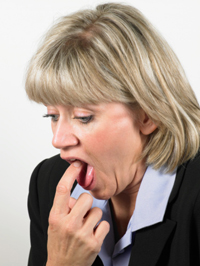I did it for decades. I still see others doing it regularly. Truly, I saw a professional captain do it this week. There’s water in the bilge and we want to know, is it fresh or salt? It does make a difference. In most instances, fresh water is from the water tank and can’t sink the boat. Salt water is from the ocean and can sink the boat. Knowing if it is fresh or salt water can assist in solving the problem of where the water came from. A taste quickly answers the question and then we continue on the process of solving the problem at hand. One solution for fresh water and another for salt water. No big deal …right? WRONG!
My wife laughed at the thought of someone tasting bilge water to determine its salinity. This article will do the most good and be most relevant to men; women don’t need this low level intelligence reprimand. Thank goodness because someone needs to take care of the kids’ safety! Now if you are a member of the smarter gender, keep reading, if only for the humor that we men actually taste bilge water.

One of my mentors often says, “Nothing good ever comes from water in the bilge.” Fresh water in the bilge can rot wood, promote mold, stink and is generally yucky. Salt water does not rot wood (trivia tidbit) but it causes corrosion, stinks and is also yucky. Whatever the source, it should be found and eliminated. I am not advocating a need for a perfectly dry bilge, and I have had friends who needed help to get over that obsession, but active, unexpected leaks should be addressed.
The bilge is usually a dirty, unclean, cesspool that collects all manner of pollutants and contaminates. The bilge is the bottom of a vessel in which there are tanks holding fuel and waste, engines have oil and coolant and there are all manner of poisons aboard. There are hoses with connections to fittings carrying the fuel and waste (and other toxins). The boat moves, vibrates, heats and cools, and these fluids do not stay contained. The leaking fluids usually find their way to the bottom of the boat, the bilge.
The normal maintenance of the boat, including washing the exterior and cleaning the interior results in contaminants in the bilge. Sinks, showers, sump collector and deck drains are sources for contaminants. Cleaning chemicals, gifts from birds, debris tracked in on shoes, and other people’s hair… blech!
An occupational health and safety doctor followed a marine surveyor on a job and then spoke to a surveyor’s association meeting. He started and ended with one clear message. In between, he discussed other significant safety issues like confined spaces, gas freeing of tanks, climbing ladders and big boats suspended over our heads, but above all he stressed one simple behavioral change. “Don’t taste the bilge water!”
Few people need to know if the bilge water is fresh or salt as often as a marine surveyor. However, as a boater, you will inevitably be asking that question at some point in your boating career. I did not realize how often this situation arose, until I stopped doing it. In my normal course of inspecting boats, I am asked if the water is salt or fresh once a week. It is often not said, but implied that I should taste it; after all I am the surveyor. I’ll suggest a safe way to answer this question later, but the most important immediate response is, “I aint tastin’ it, and you shouldn’t either.” I have noticed many marine professionals need to answer the question in order to continue up the logic tree of problem solving. As an owner, you can always pay someone to taste the water for you.
The good doctor that advised the large audience of marine surveyors against using our taste buds to determine salt or fresh, had sound reasons. He mentioned several diseases, including incurable ones like hepatitis. He also mentioned several other terms that I did not comprehend, and don’t want to, but more than one included the term “fecal”, enough said.
So, I don’t care how many times you have done it or how long you have been doing it, stop tasting the bilge water now. I am sure I have tasted the bilge water for as long, and as many times as most of you, but I stopped cold turkey, no 12 step program, no counseling, I didn’t start smoking or eat more pie as a substitute. I just stopped and have lived for several years now with no detrimental side effects. If I can stop, so can you!
Now, that we have eliminated tasting the water as a means of determining its source, which can be a very important determination, what do we do?
One method used by professionals is the use of silver nitrite. A few crystals of silver nitrate in the unknown water will quickly provide the answer. White deposits in the bottom mean salt water. A light cloud suspended indicates fresh water. It is very simple and quick.
It is very simple and definitive. We tried mixing fresh and salt water 50% and the resulting mixture still indicated salt water, but to a lesser extent.
Silver nitrate is crystalline at room temperature. It is available at chemical supply stores and may require a business licenses to acquire. It should be kept out of sunlight and off your skin. While it may not be a compound you currently have on your boat, the upside is worth the effort or you can simply bring a sample by our office and we will safety test it for free. Boat repair professionals or anyone who regularly needs to answer this question should invest in some silver nitrate and keep it handy.